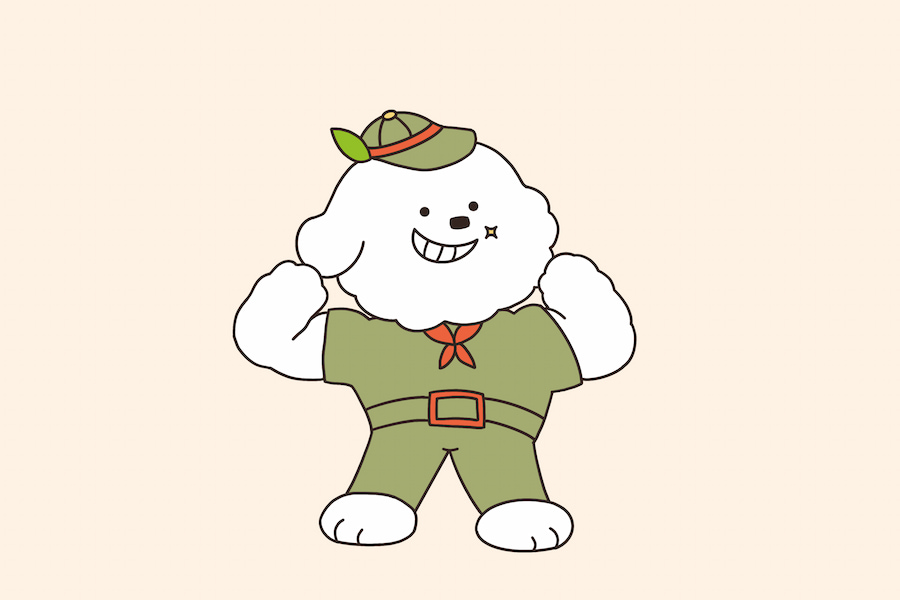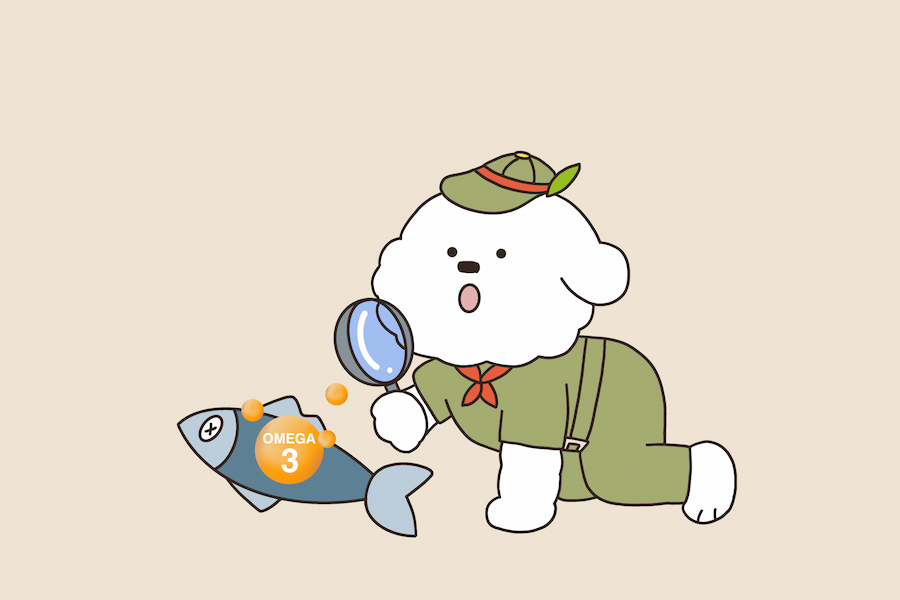Dogs’ diets should include calcium, which is an essential mineral. Calcium for dogs contributes to the development of strong bones as well as the digestive and cardiovascular systems.
Learn more about the benefits of calcium for dogs, how much is advised, and how to make sure your dog is getting enough of this essential mineral in their diet by reading this detailed guide.

Calcium for Dogs
The two most prevalent minerals in a dog’s body are calcium and phosphorus.
Although calcium’s significance in the growth and maintenance of strong bones and teeth is well-known, it serves other purposes as well.
Phosphorus, on the other hand, is essential for energy metabolism, and vitamin D is needed to maintain the proper ratio of calcium to phosphorus in dogs.
Puppies require a lot of calcium in their food since it is essential to their optimal growth. They run a danger of suffering limb abnormalities and fractures without it.

They require two to three times as much calcium as an adult dog.
Benefits of Calcium for Dogs
In the canine body, calcium serves a variety of functions, such as:
- Aiding in digestion
- Facilitating muscle movement
- Stimulating the release of hormones
- Facilitating to keep the heart in rhythm
- Stimulating wound healing
- Stimulating skeletal formation

What Can I Give My Dog for Calcium?
To help your dog consume more calcium, you can give it a variety of meals and supplements. To be sure your dog receives the optimal amount of calcium, consult your veterinarian when choosing which foods to feed them.
As the primary component in mineralizing the dog’s growing skeleton, you should feed your dog food high in calcium. Selecting food sources that are easily absorbed in the intestines is important.
To find out if your dog food satisfies dog calcium needs, read the labels. If your dog is fed low-calcium dog food, you might want to consider supplementing their diet.
High Calcium Dog Food
Below are some high-calcium dog foods that you can give to your dog:
Yogurt
For dogs, yogurt is the most important source of calcium. One cup of yogurt has 450 mg of calcium in it. You should give your dog a teaspoon or two to get the recommended amount of calcium, depending on their size.
Cheese
Since cheese is a dairy product, it has a high calcium content. One ounce of hard cheese, such as cheddar or jack, has 200 milligrams of calcium.
Dogs can safely consume cheese, but you must be selective about the kinds of cheese you give them. Cheese containing other herbs or products should not be given to your dog as it may be poisonous to them. Cheeses that are safe to eat include plain low-fat cheese, goat cheese, cottage cheese, and mozzarella.
Because these cheeses are low in fat and lactose, there is less chance that they will cause digestive problems for your dog or lead to obesity.

Large servings of cheese should be avoided as they can cause weight gain.
Fish, Chicken, and Dried Pollock
Fish, chicken, and dried pollock are excellent sources of calcium for dogs. Fish and chicken bones, when properly cooked and ground, provide bioavailable calcium that is easily absorbed by a dog’s digestive system. Dried pollock, on the other hand, offers a concentrated source of highly bioavailable calcium with minimal oxalates, which can hinder calcium absorption.
The combination of these protein-rich foods can supply ample calcium to support strong bones, teeth, and overall skeletal health in dogs. Incorporating fish, chicken, and dried pollock into a balanced diet ensures that a dog’s calcium requirements are met, promoting optimal growth and development throughout their life stages.
Veggies
Certain plants contain a lot of calcium. The vegetables with the most calcium are these:
- Arugula
- Acorn squash
- Broccoli
- Bok Choy
- Chard
- Corn
- Chicory
- Collard greens
- Dandelion
- Mustard greens
- Turnips
- Kale
- Spinach
Broccoli and spinach have the highest calcium content. Broccoli contains 180 mg per cup, while spinach contains 240 mg.
Bones
Bones frequently contain a lot of calcium. Dogs also enjoy chewing on bones but exercise caution. Certain bones may cause digestive problems or oral pain for your dog.

Insufficient chewing of bones might lead to internal organ damage if your dog is a gulper.
Sardines
Fish with fragile, calcium-rich bones are known as sardines. Also, Sardines have 25 grams of protein and 208 calories per 100g on average.
Sesame Seeds
Sesame seeds are another excellent source of calcium that may be ground and added to recipes. Sesame seeds also contain copper, magnesium, zinc, and vitamin B1.
Eggshells
Another way to make sure the dog food satisfies your dog’s calcium needs is by adding finely ground eggshells.
Eggshells are a great, calcium-rich addition to your dog’s meal because they contain about 90-95% calcium.
Calcium Supplements
A calcium supplement is the simplest approach to give your dog more calcium in their diet. You don’t have to be concerned about indigestion or lactose toxicity when using calcium supplements.
Giving your dog the recommended dosage of calcium to strengthen their bones and immune system is made easier with the help of calcium supplements for dogs.
Best Natural Source of Calcium for Dogs
The best source of calcium for dogs is discussed below:
Dried Pollock
For dogs, Dried Pollock is the best source of calcium. Whitefish called Pollock is dried and made into crunchy treats. The drying process enhances the fish’s concentration of calcium and other minerals.
Over 300 mg of calcium can be found in only one ounce of dried pollock. That’s almost thirty percent of a medium-sized dog’s daily calcium requirements! Additional nutrients like protein, phosphate, and omega-3 fatty acids are also present in dried pollock.
Dried pollock is an excellent source of calcium for dogs due to its high bioavailability and low oxalate content. The calcium in dried pollock is easily absorbed by a dog’s digestive system, ensuring optimal utilization for maintaining strong bones and teeth.
Additionally, the low levels of oxalates, which can inhibit calcium absorption, make dried pollock a superior calcium source compared to many plant-based options. The combination of calcium and vitamin D present in dried pollock further enhances calcium absorption and bone health such as patellar luxation for canine companions.

Lee&Pol combines calcium and nutrient-rich dried pollock with freeze-dried fruits and vegetables to offer the best dog treat, packed with both animal and plant-based nutrients!
How Much Calcium Does a Dog Need (Per Day)?
For healthy adult dogs, 50 mg of calcium per kilogram of body weight is advised. This indicates that the daily calcium needed for a 20 kg dog is around 1000 mg or 1 gram.
AAFCO, the Association of American Feed Control Officials, suggests that dog food has 1.25 grams of calcium for every 1,000 calories. For the 20 kg dog we discussed earlier, 800 calories a day would be required to meet the daily need.
The amount of calcium a dog needs varies depending on age, breed, gender, and lifestyle. For example, to maintain their strength and encourage good bone formation in the puppies, pregnant and nursing dogs require higher doses of calcium than usual. Furthermore, Eclampsia, a potentially fatal illness, can result from inadequate calcium intake during pregnancy.
Furthermore, puppies require a restricted calcium intake because an excessive quantity can increase the likelihood that Hip Dysplasia will develop later in life, especially in breeds prone to joint ailment.
How Much Calcium Does a Puppy Need Per Day?
Puppies require at least 3 mg of calcium per calorie, which is two to three times more than adult dogs need. Both the NRC and AAFCO agree on this.
Puppies should consume no more than 4.5 mg of calcium per kcal (4.5 g/Mcal). Large-breed puppies are particularly vulnerable to developing abnormalities in their bones and joints if they receive an excessive amount of calcium and phosphorus during the first six months of life.
Additionally, puppies require more phosphorus than adult dogs. Never supplement a puppy’s homemade diet with basic calcium. To deliver the right amount and ratio of calcium to phosphorus, puppies require bone meal or another supplement that contains both minerals.

Lee&Pol continuously researches recipes to ensure your dog can enjoy calcium-rich dried pollock deliciously!
Does My Dog Need a Calcium Supplement?
The short answer is no. In general, a dog’s requirement for a typical calcium supplement is limited to situations when the dog’s diet lacks calcium or when the dog has specific medical issues. Only a blood test performed with your veterinarian can determine this.
There are circumstances where calcium deficiency in dogs occurs. For instance, since meat is high in phosphorus but low in calcium, it’s possible that your dog isn’t getting enough calcium if they follow a homemade or raw food diet. Certain dogs may also experience deficiencies when they are pregnant or nursing. In these cases, it can be beneficial to supplement your dog’s diet with foods high in calcium.
Are Calcium Supplements for Dogs Safe?
Giving calcium supplements to dogs lacking in the mineral is the only situation in which they are safe and advised. If not, dog calcium levels must be closely watched to avoid imbalances or overdose.
Conventional calcium supplements for dogs include 500 mg or more calcium content per tablet. Over time, this becomes too much when given to a dog who is not weak in the mineral. For example, if a 50-pound dog takes three tablets daily, they will receive an excess of 1500 mg of calcium each day (provided they are fed a commercial diet that provides enough calcium each day). A 1500 mg calcium dose is more than the daily necessary amount for a dog of that size and your dog will also be getting enough from its food.
The following are some adverse effects of high calcium intake:
- Upset stomach
- Nausea
- Kidney stones
- Kidney failure
- Vomiting
What Happens If a Dog Gets Too Much Calcium?
Your dog’s blood may contain excessive amounts of calcium, which could harm every tissue in his body, including kidneys, neurological system, and cardiovascular system. In addition, uncontrolled high calcium levels can result in coma, acute renal failure, gastrointestinal issues, and even death.
Please take your dog to the vet if you notice that they are acting strangely and if they are exhibiting any signs of high calcium or hypercalcemia. The more harm elevated blood calcium levels do to your pet’s health, the longer they go untreated.
When a dog has hypercalcemia, it indicates that their blood calcium level is very high.

Elevated calcium levels may be a secondary sign of more serious conditions such as cancer, kidney failure, Addison’s disease, and parathyroid gland tumors.
Symptoms of Low Blood Calcium in Dogs
The medical word for a low total serum calcium level in the blood is hypocalcemia. Hypocalcemia in dogs can be caused by a wide range of factors, such as trauma that can lead to issues like neuromuscular anomalies and poor bone formation, acute pancreatitis, and chronic renal failure.
By keeping an eye on the amount of calcium in the blood, the parathyroid glands, located next to the thyroid glands, regulate this mineral. Hypocalcemia may be caused by parathyroid glands that are not functioning adequately. Low blood calcium symptoms point to problems with the central and peripheral neural systems. Signs of low blood calcium in dogs include:
- Muscle tremors
- Loss of control of bodily movements (ataxia)
- Twitching
- Listlessness
- Loss of appetite
- Behavioral changes
- Seizures
- Weakness
- Panting
- Intermittent muscle spasms (tetany)
- Fever
- Convulsions
There are three ways to characterize the amount of calcium in the blood: ionized, protein-bound, and complexed calcium. There are two methods used to measure the calcium levels in your pet’s blood. An ionized calcium reading will provide a more precise indication of the levels. In contrast, a total calcium test is a quick and easy method to get an overview of how the calcium levels appear.
Conclusion
For dogs of all ages, from puppyhood to old life, calcium is a vital mineral. You may promote your pet’s overall health by making sure they get the right quantity through balanced food or supplements if needed. Remember that each dog is different, so consult with your veterinarian to determine how much calcium your dog should be getting. You can maintain your dog’s teeth, bones, and overall health with the right advice.
FAQ
Yes, the growth of a dog’s bones and teeth depends on calcium. It also helps with digestion, hormone release, and muscle contraction.
Yes, dogs’ bones, muscles, and nerves depend on calcium. Growth, heart health, hormone balance, and digestion are all supported by it. Enough calcium consumption is essential for the overall health of dogs.
No, as human calcium supplements are made for people with a much greater weight class than dogs, you should not give them to your dog. Dogs may be harmed by substances included in human calcium supplements.
Yes, calcium is necessary for maintaining bone density in senior dogs. However, too much calcium can also lead to the development of kidney and bladder stones. Consult your veterinarian about the appropriate calcium supplementation.
For healthy growth, puppies require more calcium than older dogs do. If they don’t get enough calcium in their diet, they might need supplements. For the appropriate amount, dependent on breed and age, talk with your veterinarian.
Foods high in calcium include eggshells, yogurt, cheese, sardines, salmon, and leafy greens. You can also add bone meal or calcium supplements made specifically for dogs. Always ask your veterinarian about the right sources and dose.
For the development of puppies, more calcium is required during pregnancy and breastfeeding. We recommend calcium supplementation during 4-6 weeks of gestation.
Calcium is only harmful to dogs when given in large amounts. Hypercalcemia and kidney and bladder stones can result from an excess of calcium.
For mature dogs, 50 mg of calcium per kilogram of body weight is advised. Puppies require 3-4.5 mg of calcium per kcal for their bones to grow properly. For specific calcium needs for your dog, consult with your veterinarian.



